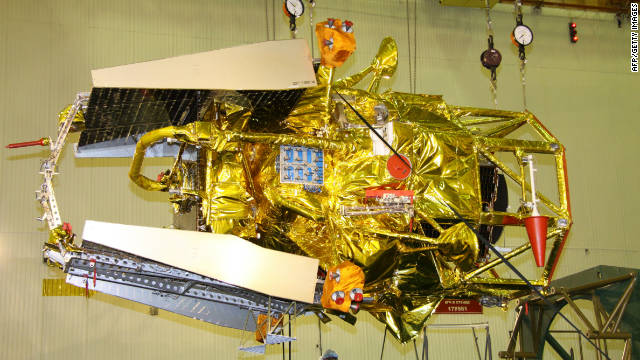 A Russian probe that was supposed to reach one of Mars’ moons but failed to escape Earth orbit is expected to fall to Earth between Saturday and Monday, Russia’s space agency said.
A Russian probe that was supposed to reach one of Mars’ moons but failed to escape Earth orbit is expected to fall to Earth between Saturday and Monday, Russia’s space agency said.
It’s too early to say where pieces of the unmanned Phobos-Grunt probe could fall. But on Sunday afternoon – the middle of the re-entry window – the nearly 15-ton probe is projected to be over the Indian Ocean, hundreds of miles southwest of Indonesia, the Roscosmos space agency said Wednesday.
Twenty to 30 fragments, weighing a total of up to 440 pounds, could survive the heat of re-entry, Roscosmos said, according to the state-run Ria Novosti news agency.
The craft is carrying 7.5 tons of toxic fuel. That fuel is expected to burn up on re-entry, Ria Novosti reported, citing Roscosmos.
The $163 million probe, launched on November 9, was supposed go to Mars’ Phobos moon, where it was to collect soil and rock samples. A capsule containing the samples was to then return to Earth.
But the probe’s propulsion system failed to work after it reached low-Earth orbit.
The craft falling to Earth also contains a Chinese satellite, the Yinghuo-1, which was to be delivered to Mars orbit, where it was to observe the Red Planet. The Yinghuo-1 was going to be China’s first mission to Mars.
The U.S. Strategic Command, which says its Joint Functional Component Command for Space routinely tracks space objects, released a statement saying that “recent reports estimating (Phobos-Grunt) re-entry between January 13-17 are consistent with JFCC-Space and other United States government analysis.”
“Predictions of re-entry date, time and location can change significantly due to many changing factors, such as solar weather and orientation of the spacecraft,” the command said in the statement.
The probe’s loss is the latest in a series of recent setbacks for Russia’s space program.
On August 24, a Progress M-12M space freighter carrying food and other items to the international space station broke up over southern Siberia after failing to separate from its Soyuz-U carrier rocket, RIA Novosti reported.
Six days earlier, Russia lost a sophisticated Express-AM4 telecommunications satellite when the launch vehicle put it into the wrong orbit.











